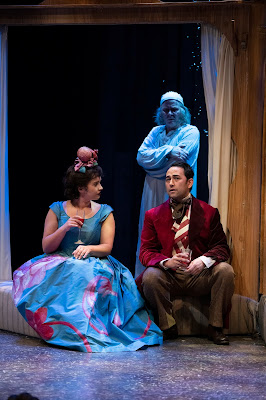Reviewed by James Karas
Anton Chekhov’s The Three Sisters is a subtle and complex play that demands the highest production values and acting talent from any company that dares produce it. Poreia Theatre of Athens, Greece produced the play and recorded it for streaming. This review is of the streamed version. Dimitris Tarloou has directed and, with Eri Kourgia, dramaturged, the play in a creditable production that deserves praise and a few complaints.
The Three Sisters tells the story of the daughters of General Prozorov who died one year before the opening scene of the play. The young women moved to a provincial town eleven years ago when their father was appointed commander of the local artillery unit. The provincial town has proven to be a deadly place, a social bore. a destroyer of souls and a place that one wants to escape from. The three sisters dream of returning to Moscow and share pleasant memories of life in the capital as their situation in the provincial city deteriorates.
The production is done in modern costumes and Tarloou has made The Three Sisters a contemporary Greek play. There is some singing in the play and the characters sing snippets of popular Greek songs. The toast that two men make is with tsipouro, a popular hard liquor usually associated with Greek peasants who tended to distil it themselves.
The set is unrealistic with the most prominent feature being some rows of seats in front of the main playing area. It looks like an audience that watches the play, but members of the cast sit there and they walk onto the main stage when their turn comes up. It is an interesting touch that may be characterized as Brechtian. At the back of the set there is what Chekhov describes as a drawing room of a well-off family that has a large table. The rest of the set is sparsely decorated and a piano is prominently visible. One of the daughters was a piano player.
We also see at the corner of the screen two musicians, a clarinet player and a trombone player. The play does call for some music but I don’t recall the need for the latter two. Be that as it may, the two musicians are put to much use. Frequently they play during the dialogue and at about the same volume. The music they play is undistinguishable largely because it interfered with the dialogue and I found it, to put it politely, annoying. We see the musicians walk across the back of the stage and at one point other instrumentalists join them to form a band. No doubt, the director had something in mind by providing us with the musicians and their music, but unfortunately, the reason escaped me.
Alexandra Aidini plays the oldest sister Olga as a decent
person, a teacher who is not married and is solicitous of the welfare of the
old servant Anfisa (Marietta Sgourdaiou).The ill-tempered middle sister Maria
or Masha is played by Ioanna Pappa. She is married to Kulygin but is unfaithful
to him with Vershinin. The youngest sister Irina (Lena Papaligoura) at 20 is a
bit immature and dreams intensely of returning to Moscow, a place of happy
memories. She marries Baron Tuzenbach and the marriage does not go well.
Laertis Malkotsis plays their brother Andreas (Andrey in
Russian) as man who has ambitions of becoming a professor at a Moscow university
but he marries the despicable Natalia and settles for a job as secretary to the
town council. He is a serious gambler who accumulates huge debts, is treated
like the village idiot and has an evil wife who is having an affair with the
President of the Town Council.
Andreas’s wife Natalia deserves special mention. Played
by Marianna Dimitriou, she is petty, vengeful, destructive, cruel, shallow and disgusting.
She starts as a country bumpkin not knowing how to dress and is the target of
ridicule. By the end of the play, she has gained complete control of the house
and driven the sisters out and her husband into abject submission. And of
course, she is an adulterer whose second child may well be by her substitute
husband.
The siblings live in a provincial town with dreams of
escaping. The women smoke, dress well, at least reasonably well, and are
attractive. Their disillusionment is at the core of their existence and it is
this that the actors exude so masterfully in their performances.
The men share some of those traits but they try to be
more optimistic or philosophical. Lieut. Col. Vershinin replaced the sisters’
father as commander of the army unit and knows them from their childhood. He is
a direct connection to their memories and dreams of Moscow. Giannis Dalianis
gives an exceptional performance as the philosopher officer, unhappy husband,
lover of Masha and an optimist for civilization.
Chebutykin is an old, pathetic army doctor who has
forgotten what he knew about medicine, gets drunk and finds peace in believing
in nothing, Giorgos Biniaris takes advantage of the acting opportunities
provided by this eccentric character.
Baron Tuzenbach (Pantelis Dentakis and Captain Solyony (Dimitris Bitos) are officers
who bicker and in the end duel with one of them being unsuccessful.
The play has more than a dozen characters to present Chekhov’s subtle and complex vision of Russian society at the turn of the twentieth century. Tarloou’s adaptation and transfer of that vision to modern Greece is imaginative and, in some respects, brilliant. But it has the inherent problem of such adaptations and chronological shifts. His fine directing of a superb cast allows us to suspend our disbelief and holds our attention and even if we know that a provincial town in 21st century Greece is a long way from 19th century Russia, we appreciate the production.
_________________
The Three Sisters
by Anton Chekhov, adapted by Dimitris Tarloou and Eri Kourgia, in a
production Poreia Theatre, Athens,
Greece was streamed on demand by www.poreiatheatre.com








